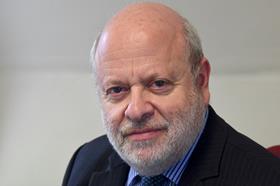Earlier this year, the prime minister announced that the UK aid budget would be cut from 0.5% to 0.3% of gross national income, to support an increase in defence expenditure.

At around the same time, the US government effectively shut down its aid arm (USAID), transferring the rump to the State Department, because international aid is not seen as a priority in relation to the government’s needs and values.
In Europe, individual countries have cut back their aid expenditure, and defence spending is rapidly increasing.
This concerns lawyers because there is also aid spent on lawyers’ concerns: the rule of law, the training of judges and lawyers, and legal support for the vulnerable.
The American Bar Association is suing the US government in three separate court actions to seek multi-million grants restored. Two are with other organisations similarly affected, in relation to international rule of law and human rights, and support for immigrants on the southern border who would otherwise have to navigate the legal process on their own.
The third is in the ABA’s own right, because the Department of Justice (DOJ) has cut off its funding to train and provide technical assistance to lawyers and judges who work with survivors of domestic violence and sexual assault. The ABA argues that this is retaliation, since the funds were stopped the day after a DOJ memorandum criticising both the ABA’s other federal funding litigation and its policy positions that the current administration doesn’t like. Interestingly, the DOJ did not terminate funding to other organisations doing similar work.
Should we care about cuts to public grants which go to legal services? Aid which buys necessary items which poor people will not obtain elsewhere – food, medicine, accommodation – is an undeniable good, but legal services usually fall within a separate category.
Read more by Jonathan Goldsmith
Legal services funding may cover some of the following areas: ensuring the independence of the judiciary; introducing new laws in developing countries to cover areas of law which are lacking in, say, technology or international finance; training lawyers on core values or new developments; and providing legal services directly to those who need them and have no other assistance. There are also innovative projects like helping lawyers to represent victims from their own country before the International Criminal Court, where that expertise is not found locally.
Of these, direct legal services to the vulnerable most closely resembles the purchase of food for the hungry or shelter for the homeless.
Aid in general is subject to a number of well-known criticisms:
- it encourages dependency rather than self-motivation in its beneficiaries;
- it is funded by rich countries to promote what they think others need, rather than what the beneficiaries themselves want;
- it is usually coloured in the case of law by the legal system from which the funder originates, so that when, for instance, US and UK lawyers feature as trainers or capacity-builders in international projects funded by Western grantors, the common law way of doing things may be advanced in countries where such concepts do not fit.
I undertake publicly-funded legal work. Most of it escapes these criticisms because it consists of EU funds spent within the EU, to help train EU lawyers and to conduct research on EU topics.
But I have undertaken EU and other publicly funded legal work in countries on the periphery of the EU. When I was in an EU accession country, and had come to speak about EU values and minimum requirements for accession, there was some hostility from the beneficiaries, as if I were a colonial officer relaying the orders of the Big Queen. The local lawyers did not like it when told they had to change their fee rates from a bar-regulated tariff to a more competitive system, that they had to allow lawyers to have more than one office, or to allow joint practices or limited liability partnerships from the EU into their country.
The above makes it seem as if I think that cuts to publicly funded legal services projects should be welcomed. But I think exactly the opposite; I just decided to get the criticisms out of the way first.
Publicly funded international legal services projects produce a variety of benefits. Leaving aside the obvious good of direct legal services to the vulnerable, and focusing on projects where the beneficiaries are lawyers themselves, the legal sector depends mostly on intellectual endeavour and cross-border cooperation, where the players on both sides are nearly always university-educated, self-sufficient service providers. Good projects introduce new ideas to either side and so educate them, they introduce new people to each other, and they stimulate debate and future exchanges. They may introduce a solid new benefit – training on a new law, or the drafting of a new proposed statute or rule – and, for this, they are cheap (much cheaper than other funded projects which require the purchase of actual physical goods).
All this outweighs any perceived disadvantages.
Jonathan Goldsmith is Law Society Council member for EU & International, chair of the Law Society’s Policy & Regulatory Affairs Committee and a member of its board. All views expressed are personal and are not made in his capacity as a Law Society Council member, nor on behalf of the Law Society































No comments yet